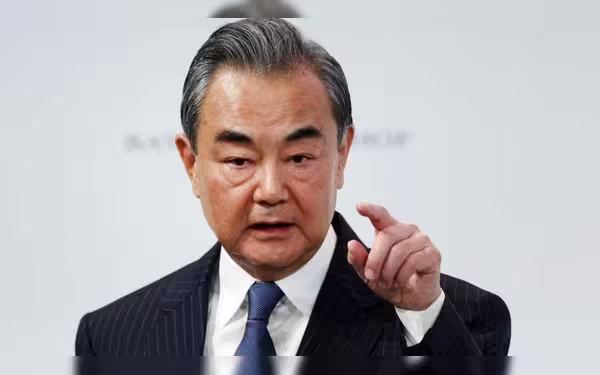Tuesday, July 2, 2024 03:11 PM
Chinese Foreign Minister Wang Yi criticizes AUKUS partnership
- Opposition to AUKUS trilateral defense partnership in Pacific region
- Concerns over nuclear submarine development by US, UK, Australia
- Emphasis on South-South cooperation and respecting Pacific countries' needs
 Image Credits: The Daily Guardian
Image Credits: The Daily GuardianChinese Foreign Minister Wang Yi criticizes the AUKUS trilateral defense partnership, emphasizing the importance of South-South cooperation and respecting Pacific countries' needs amidst escalating competition for influence in the region.
Chinese Foreign Minister Wang Yi has voiced strong opposition to the AUKUS trilateral defense partnership involving the US, UK, and Australia, stating that the Pacific region should not be a battleground for major power rivalries. During a press conference in Papua New Guinea alongside his counterpart Justin Tkatchenko, Wang expressed concerns over the AUKUS agreement, particularly objecting to the introduction of nuclear submarine development by the three nations in the region.
Wang emphasized that the Pacific should not be used as a playground for major powers, citing potential violations of the Treaty of Rarotonga, which established the South Pacific Nuclear Free Zone in 1985. He reiterated China's stance against bloc-to-bloc confrontation in the region, emphasizing the importance of respecting the needs and historical development of Pacific countries.
Furthermore, Wang highlighted China's commitment to 'South-South cooperation,' a collaborative approach based on solidarity among developing nations rather than driven by geopolitical interests. In response to efforts aimed at countering China's economic influence in the Pacific, Beijing has been strengthening its relationships with Pacific island nations, including signing a controversial security agreement with the Solomon Islands in 2022.
This agreement has raised concerns about the presence of Chinese warships in Solomon Islands' ports and the authorization for Chinese security personnel to maintain social order and protect Chinese projects in the region. Critics argue that the agreement effectively serves as a 'security pact,' enabling China to deploy its military for the protection of its citizens and interests in the southern Pacific Ocean.
Chinese Foreign Minister Wang Yi's criticism of the AUKUS partnership underscores the escalating competition for influence in the Pacific region. As major powers vie for strategic advantages, the delicate balance of power in the Pacific is increasingly under scrutiny. China's proactive engagement with Pacific island nations signals its determination to assert its presence and counter external pressures. The evolving dynamics in the Pacific highlight the complex interplay of geopolitical interests and regional security concerns, shaping the future landscape of the Asia-Pacific region.













